Unit 6 Good manners复习课件(湖南省永州市祁阳县)
文档属性
| 名称 | Unit 6 Good manners复习课件(湖南省永州市祁阳县) | 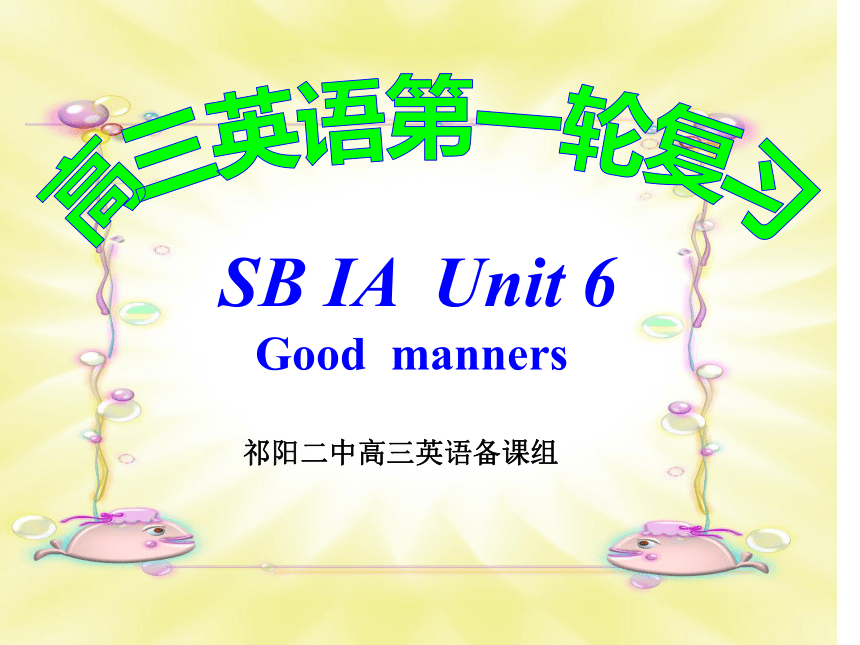 | |
| 格式 | rar | ||
| 文件大小 | 3.4MB | ||
| 资源类型 | 教案 | ||
| 版本资源 | |||
| 科目 | 英语 | ||
| 更新时间 | 2008-10-17 19:48:00 | ||
图片预览

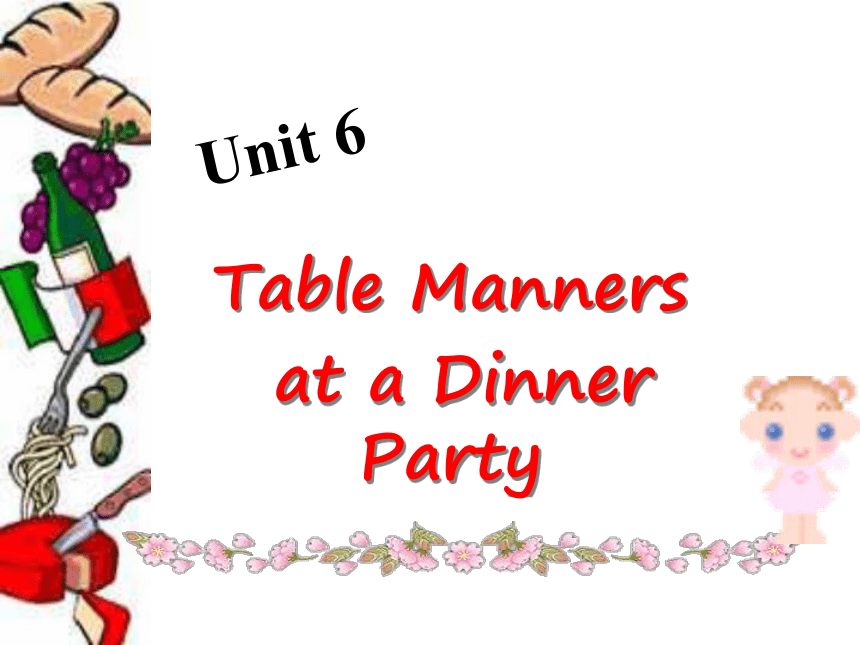
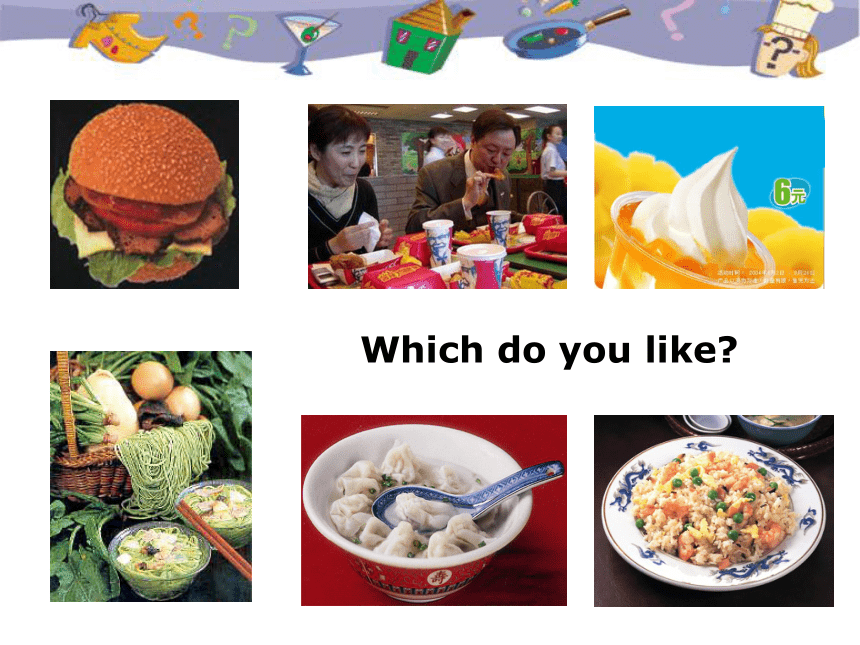
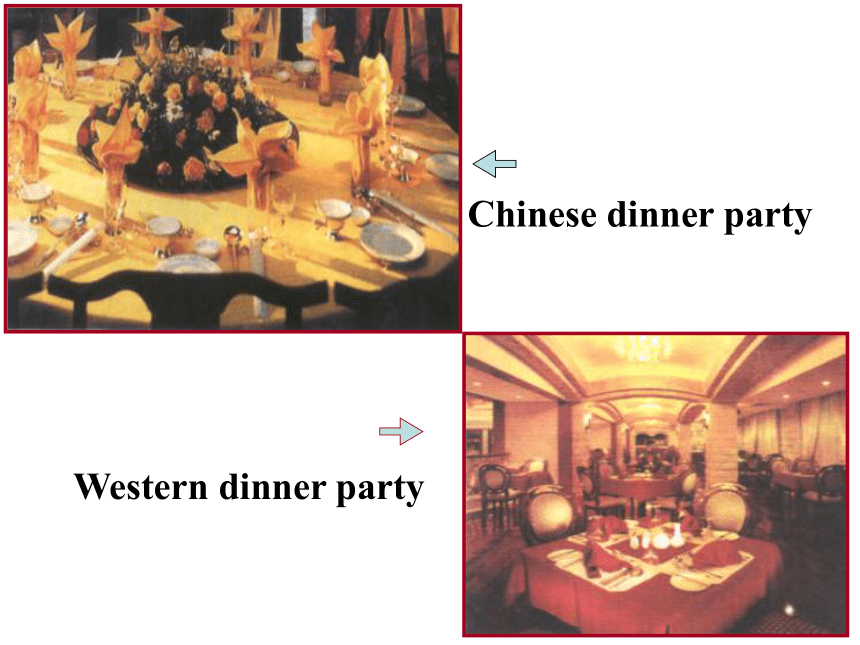
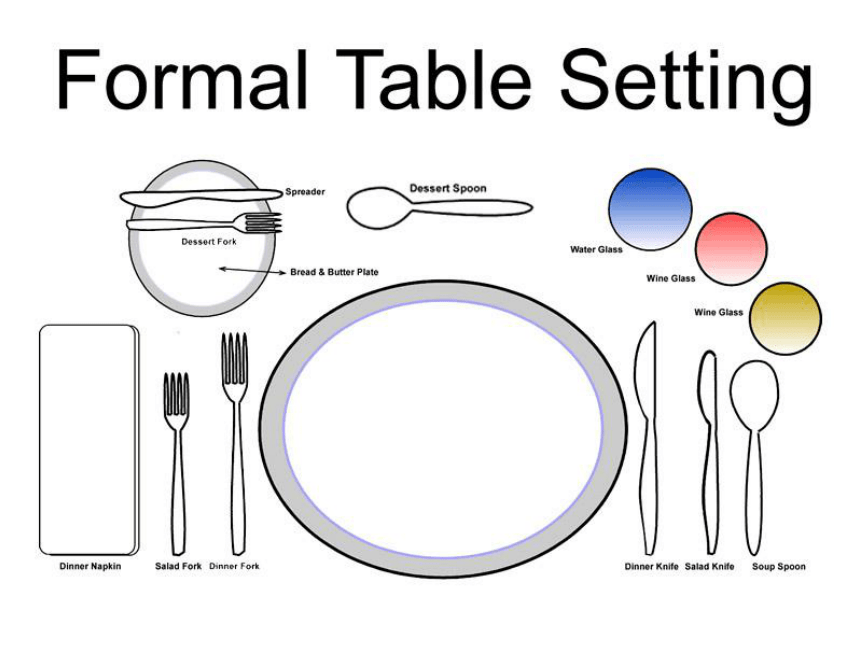

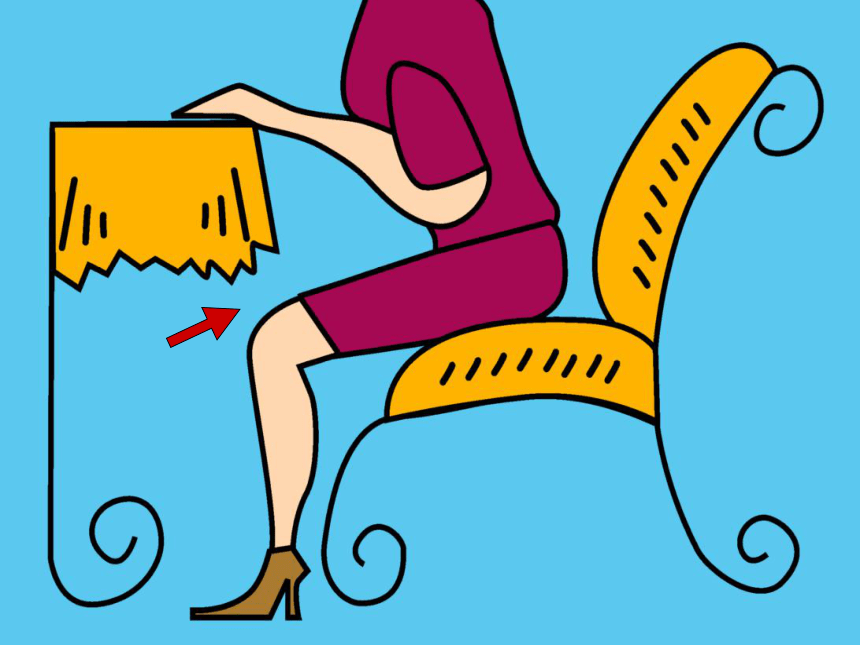
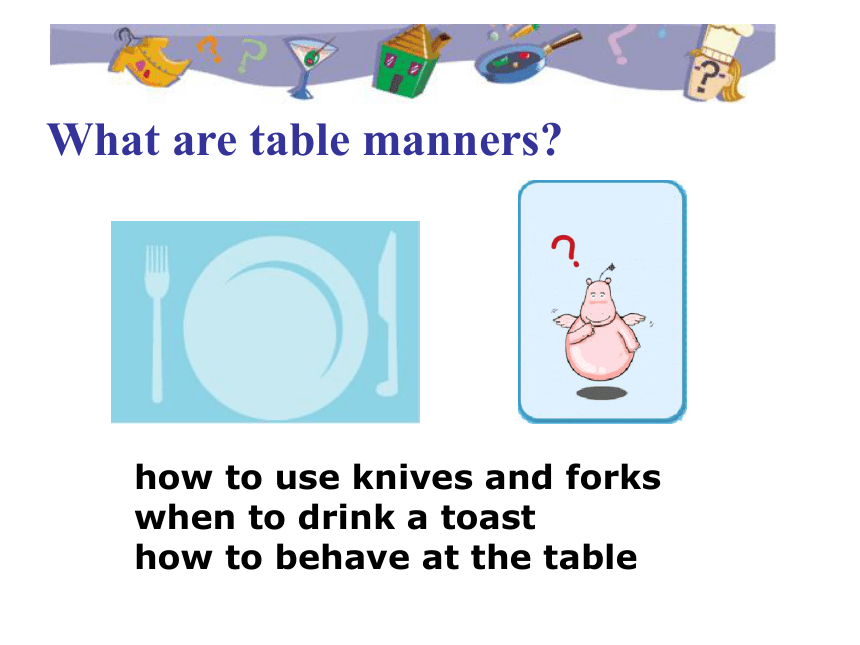
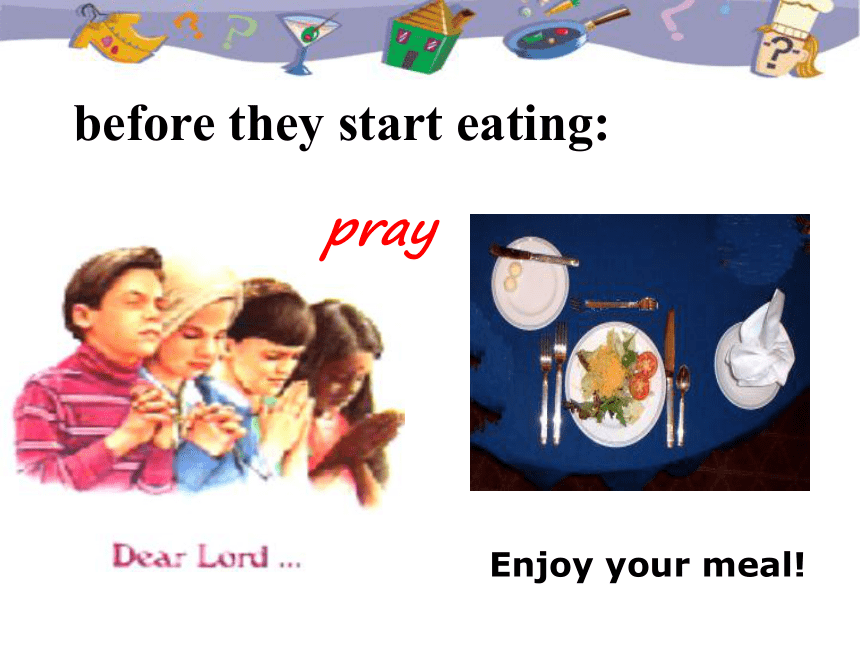
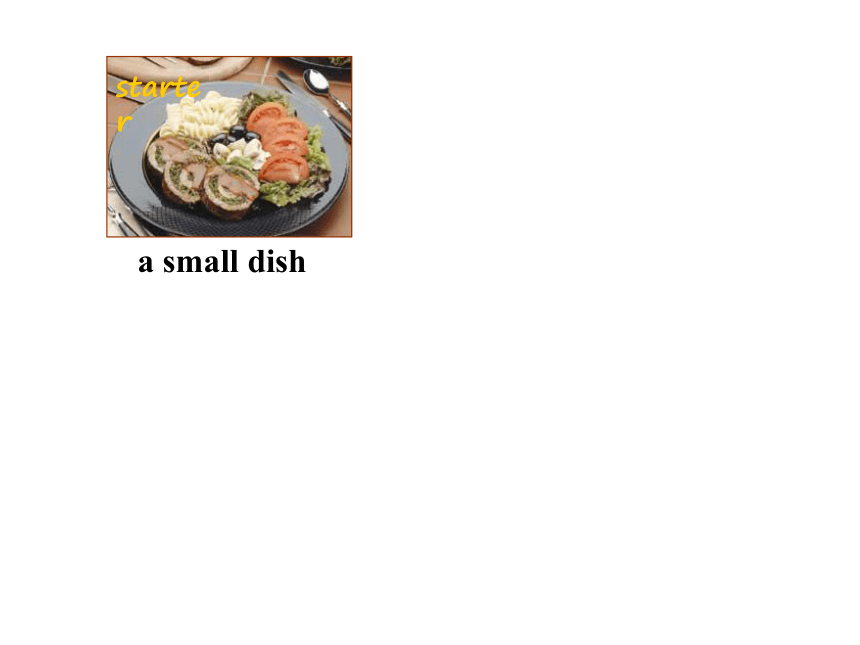
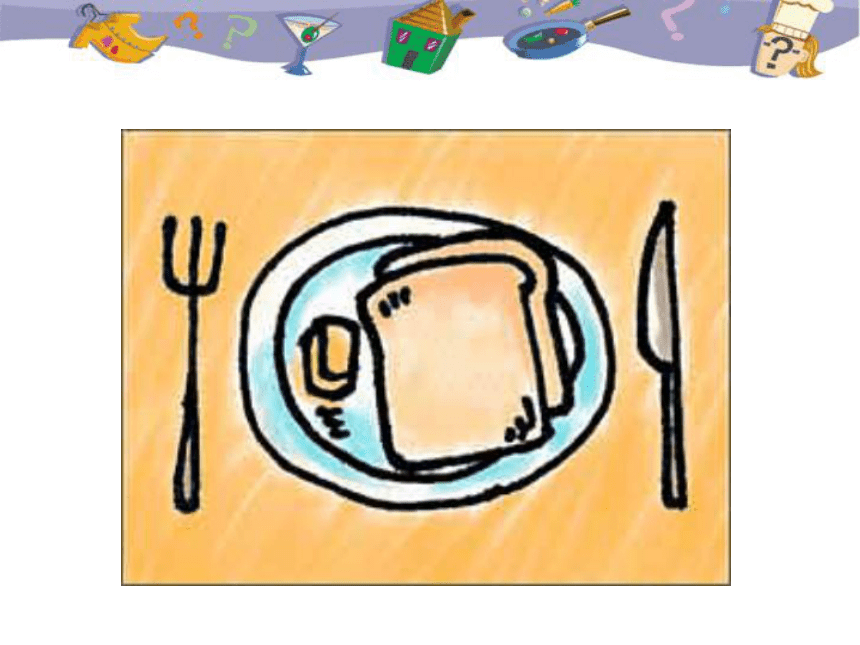
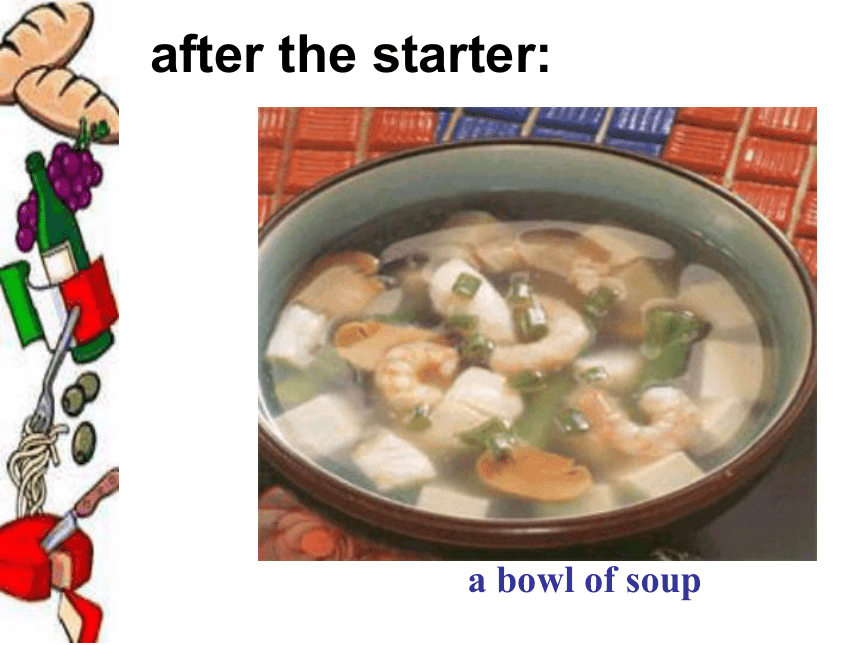
文档简介
课件124张PPT。祁阳二中高三英语备课组高三英语第一轮复习 SB IA Unit 6
Good mannersUnit 6Table Manners
at a Dinner PartyWhich do you like?Chinese dinner party
Western dinner partyWhat are table manners?how to use knives and forks
when to drink a toast
how to behave at the table before they start eating:Enjoy your meal!praystartera small dishafter the starter:a bowl of soupstartera small disha bowl of soupmain coursemain coursethe chicken breast with its tender white fleshstartera small disha bowl of soupmain coursewhite or red wineraise glasses but not touchdrink white or red wine with the foodstartera small disha bowl of soupmain coursewhite or red winedessertdessertMain
coursedessertdrinksTeaching contents
1.Useful words and expressions
2.Important language points
3.Exercises
4.Homework
单元复习预览Words: fault apologise introduce manners
stare besides impression
Phrases:
apologise to sb for doing sth
make a good impression on sb
drink a toast to
pay a visit to sb/sth
lay a table leave out
keep sth in mind be happy withImportant wordsapologis(z)e 道歉(vi.)
过错
介绍
道歉(n.)
原谅
文化
方式,礼貌
印象,感想
干杯,烤faultintroduceapologyforgiveculturemanner(s)impressiontoastbehave napkin dessert unfold damp custom pray course举止,举动
餐巾, 餐巾纸甜点心展开,显露潮湿的习俗, 风俗祈祷一道菜, 过程 flesh raise advice spirits impolite extra stare disabled
肉
举起, 饲养建议, 劝告烈酒不礼貌的额外的盯着 残疾的Useful expressions1.一封感谢信
2.把……介绍给
3.为…向某人道歉
4.留下好印象
5.为某人的健康干杯
6.喝一小口
7.赶时髦
8忙于
9.敬酒的习惯
1.a thank-you letter
2.introduce…to sb.3. apologize to sb. for sth.4. make a good impression5. drink to one’s health6. take a sip7. follow the fashion of time8. be busy with9. the custom of toasting10.有礼貌
11.招待某人吃饭
12.请随便吃
13.省去,遗漏
14.最后
15.评价
16.摆餐桌子10.have good manners11.serve sb. with a meal12. enjoy your meal13. leave out14. in the end15. take/make comments on16. lay the table单元复习视点Sentence patterns:
1.Knowing them will help you make
a good impression.
2.When you see two spoons, the big one is for
the soup and the small one for the dessert.
3.In china, you sometimes get a hot, damp
cloth to clean your face and hands, which,
is not the custom in Western countries.
Important
language points词语细解1.He is such a man who is always ____
fault with other people.
A. putting B. seeking
C. finding D. looking for 指点迷津
1.fault① n. 过错,缺点,故障,毛病
Her greatest fault is that she talks
too much.②.find fault with 挑剔
He is always finding fault with me. faultless adj. 无错误的;完美的
faulty adj. 有缺点的;有过失的;不完的
find fault in 看出……的缺点思维拓展③.vt. 对……挑毛病 It was impossbile to fault her performance.
巩固提高2. You have made a ____.You have ____
two lines from paragraph.
A. fault ; left B. mistake; left
C. fault; left out D. mistake; left out
2. apologize(同apologise) vi. 道歉,认错apologize for sth./doing sth
因做了某事而道歉
apologize to sb for sth./doing sth
因某事而向某人道歉eg.1) I have come here to apologise to you.eg.2) Bill was apologising to his friend for
having kept her waiting for a long time.1. Victor apologised for____ to inform
me of the change in the plan.
A. not his being able
B. him not to able
C. his not being able
D. him to be not able即境活用2.The teacher apologized____ late.
A. to his students to arrive
B. to his students for arriving
C. at his students to arrive
D. at his students for arriving
即境活用3.The headmaster told Li Hua ____ the
angry chemistry teacher, but he refused.
A. to apologize
B. apologize to
C. to apologize for
D. to apologize to
即境活用词语细解3.He seems to ____Jane. He knows her well.
A. introduce to B. be introducing to
C. be introduced D. have been introduced to 指点迷津
3.introduce v.① vt.介绍,引进
Eg.1. I introduced John to Mary, and now they’re married.Eg.2. Potatoes were introduced into
Europe from South American.思维拓展1. introduce oneself 自我介绍
2. introduce sb to sb 介绍某人给某人
3. introduce sth into(to) 把……引进(入)……
4. introduction 介绍,引进,序言
5. a brief introduction 一个简短的导言/致辞1.The next programme is said to ____ by
Jane, which is sure to be popular.
A. introduce B. have introduced
C. be introduced D. have been introduced
2.When first ____ to the market, these product
enjoyed great success.
A. introducing B. introduced
C. introduce D. being introduced即境活用4.Every means ____, but none proved
successful.
A. have tried
B. has been tried
C. have been tried
D. have tried词语细解 to do sth. 打算做
mean sb. to do sth. 打算让----做
doing sth./ sth 意味着做某事
much/ little/a lot/ a great deal 有价值,有意义
e.g. 1. What do you mean to do next?
2. I meant to tell you, but I was too busy..
3. If it means delaying more than a week, I will
not wait.
4. He means his son to succeed.
5. His job means a lot to him.指点迷津固定句式: What do you mean by …?
eg. What do you mean by not writing back to me?
mean that …
eg. His failure in the exam means that he has to go
over his lessons again for a whole year.
means 手段,手法,(单复数同形)
all means 无论如何,务必
by means of 借助于
this means: in this way 用这种方法
eg. Finish it by all means.
Thoughts can also be expressed by means of music.1. I didn’t mean ____her
But talking like that means ____ her.
A. to hurt; to hurt B. hurting; hurting
C. to hurt; hurting D. hurting; to hurt
2. You should have thanked her
before you left
I meant ____, but when I was leaving
I couldn’t find her anywhere.
A. to do B. to
D. doing D. doing so(1) 用作可数名词,意思是“方法”,“方式”,通常用单数形式。
I love duck cooked in Chinese manner.
我喜欢吃中国烧法的鸭子。
(2) 用作可数名词,意思是“举止”,“态度”,常用单数形式。
I don't like his manner. It's too rude.
(3) 用作复数形式,意思是“礼貌”,“规矩”。
It is bad manners to speak loudly in public.
ill-mannered / 没有礼貌的
well-mannered / 彬彬有礼的
rough-mannered 粗鲁的 5.manner(1) 通常用作可数名词,意思是“印象,感想”,
He made a strong impression on (upon) us.
(2) impression的动词是 impress,意思是“留下印象”。常用短语 impress sth. on (upon) sb.“某事给某人留下印象”。
What he did was greatly impressed on (upon) us.
The girl impressed her sense of humour on (upon) her friends. 6.impression(1) 用作副词,意思是“可是,依然”。
I would like to go with you; however, I am very busy.
我很想和你一块儿去,可是我很忙。
(2) 用作连接副词,意思是“无论如何,不管怎样”。
However cold it is,he likes swimming in winter.
不管天气多冷,他喜欢冬天游泳。7.however 用作动词,意思是“跟随,跟从,遵循,遵从,顺
着…走”。
The boy followed his mother up the stairs.
Follow my advice,please.
Follow this road to the stone bridge.
常见的与 follow连用的短语
follow these customs follow the rules
follow one’s example follow one’s advice
follow this road
follow sb. / what one said8.follow注意follow非谓语形式作状语/定语时的用法:
The doctor came in, followed by several nurses.
医生进来了,身后跟着几个护士。
Several nurses came in, following the doctor.
几个护士跟在医生身后进来了。
There is a thunder following the lightning.
闪电过后,紧接着打了一个响雷。① 名词,意思是“风俗,习俗”,“习惯”, Social customs vary greatly from country to country.
② 常用作复数,意思为“海关”,
How long will it take us to pass the Customs?
③ customer 顾客
The waiters are kind to the customers.9.custom[辨析] custom,habit,hobby
这三个词都有 “习惯” 的意思,但含义有一定
的不同。
① custom 通常指大范围、长时间形成的风俗和
习惯。
② habit 通常指个人短时间的习惯。
③ hobby 通常指“爱好”。
The Spring Festival is a custom in East Asia.
He formed a habit of getting up early.
Reading is his hobby.He has formed the ___________ of smoking after meals.
It is the ________ in China to eat dumplings during the Spring Festival.
He has fallen into the ________ of getting up late.
They broke some of the old ___________.habitcustomhabitcustomsWe couldn’t eat in a restaurant because___
of us had any money on us.
A. every one B. none
C. nobody D. no one
① none 用于指人和物,可与 of 短语连用,用作单数和复数。
— “How many elephants did you see in the park?”
— “None.”
② no one 只能指人,不能与 of 连用,用作单数。
No one knows what they fought for.
③ nothing 用于指物,不与 of 连用,通常泛指 “没有什么事情或东西”,用作单数。
Nothing can change the world.10. none,no one,nothing④ none 用于回答 how many / much 提问
nobody = no one 用于回答who 提问
nothing 用于回答 what 提问
eg. --- How much water is left?
--- None.
--- Is there anyone in the classroom?
--- No one.
--- Who is playing in the playground?
--- Nobody.
None of his friends have/has been to Paris.1. I want some string but there was____
in the house.
A. nothing B. none
C. no D. neither ◆ ________ likes a person with bad manners.
◆ ________ of his friends came to help him.
◆ Almost _________ believes him.
◆ ________ of them has / have seen him.
◆ --- How much coal is left? --- _________.
◆ --- Who entered the room? --- _________.
◆ --- How many students are there in the classroom?
--- _________.No oneNone no oneNone None No oneNone The student wanted to ____ some
money to protect the animals.
A. arise B. promote
C. raise D. rise① raise vt. “举起,抬起,提出,筹集,饲养”,它必须带宾语或用于被动语态.
② rise vi.意思是“升起,上升,起立” rise up 起义,反抗 get a rise 加薪,提升 rise to 增加到(含有原数目) rise by 增加了(只强调新增加的数目).11. raise,rise,lift ,arise③ lift 用力“举起”的含义。
Price has been raised up.
Price rises gradually.
The young lifted the stone at last.
④arise(arose,arisen) vi.与rise用法基本一样,但arise
更常用于(问题等的)“出现或产生”.
1. It was not long before the whole country ___ and drove the enemy out of the country.
A. raise up B. arose
C. rose D. rose up
2.The workers are on a strike ,demanding
a ____ in their salaries.
A. arise B. raise
C. rise D. lift① sometimes 副词,表示“有时候,不时”。
Sometimes he went to work by car and sometimes by train.
Sometimes he is late for class.
② sometime 副词,表示“曾经,某时,有朝一日”,常同过去时或将来时连用,表示过去或未来某一不肯定的时间。
It happened sometime 1ast year.
Will you come and see me sometime next month?
③ some time名词词组,表示“一段时间”。
It will take me some time to read the novel.
There is some time left.12. sometimes,sometime,some time① at table 表示 “吃饭,就餐”。
You shouldn't speak loudly at table.
吃饭时你不该高声讲话。
② at the (a) table 表示“在桌子旁”。
He sat at the table,reading a novel.
他坐在桌子旁,看小说。
It is bad manners to blow your nose at table.
进餐时擤鼻子是很不雅观的举止。13. at table 与 at the table 14.drink to drink to 为……而干杯
祝酒用语,用于不太正式的场合,to 为介词,后接名词。
I drink to your success.
Let’s drink to the good harvest this year.
让我们为今年的大丰收干杯。
注意:正式场合下要用:I’d like to propose a toast to 或 I now propose a toast to
I’d like to propose a toast to the health of the guests. 我提议为来宾的健康干杯。 drink n.
soft drink
a hot drink / a cooling drink
Too much drink made him feel ill.
考题点击:
Let’s drink _____ the health of all the ladies and gentle-men present here.
A. for B. of C. towards D. to D15.I don’t suppose anyone will be
volunteer,___?
A. do I B. don’t I
C. will they D. won’t they指点迷津: think, believe, expect, suppose,
imagine……+宾语从句+反意疑问句 当主句为第一人称,谓语是think, believe,
expect, suppose, imagine等且用一般现在时,
其反意疑问句与宾语从句相对应.eg.1. I don’t think he is bright,_____ is he?eg.2. We believe she can do it
better, _______?can’t she典型例题:即境活用1.We don’t believe he will succeed,______?
A. do we B. don’t we
C. will he D. won’t he
2.The singer said that she wasn’t feeling
well that night,_____?
A. didn’t she B. did she
C. wasn’t she D. was sheThe Restrictive Clauses定语从句基础知识 定语从句:是指在复合句中,
修饰 或 的从句.
被定语从句所修饰的名词或代
词叫做“ ”.
引导定语从句的词叫“ ” 基础知识 名词代词先行词关系词How many kinds of Attributive Clauses are there?基础知识 定语从句The Restrictive Attributive
Clause
限制性定语从句
The Non-Restrictive Attributive Clause
非限制性定语从句基础知识 引导定语从句的关系词指代人
指代事物
所属关系
指地点
指时间
指原因 who,whom,that
which,that
whose,of which
where
when
why关系代词关系副词基础知识 Join the following sentences:
A plane is a machine. The machine can fly.
关系代词的实质Join the following sentences:
A plane is a machine. The machine can fly.
A plane is can fly.
关系代词的实质a machinethe machineJoin the following sentences:
A plane is a machine. The machine can fly.
A plane is can fly.
关系代词的实质a machinethat /which关系代词的实质Join the following sentences:
The girl is Mary. We saw her yesterday.
关系代词的实质Join the following sentences:
The girl is Mary. We saw her yesterday.
we saw yesterday is Mary.
herThe girl关系代词的实质Join the following sentences:
The girl is Mary. We saw her yesterday.
we saw yesterday is Mary.
herThe girl关系代词的实质Join the following sentences:
The girl is Mary. We saw her yesterday.
we saw yesterday is Mary.
herThe girl关系代词的实质Join the following sentences:
The girl is Mary. We saw her yesterday.
we saw yesterday is Mary.
herThe girl关系代词的实质Join the following sentences:
The girl is Mary. We saw her yesterday.
we saw yesterday is Mary.
herThe girl关系代词的实质Join the following sentences:
The girl is Mary. We saw her yesterday.
we saw yesterday is Mary.
herThe girl关系代词的实质Join the following sentences:
The girl is Mary. We saw her yesterday.
we saw yesterday is Mary.
herThe girl关系代词的实质Join the following sentences:
The girl is Mary. We saw her yesterday.
we saw yesterday is Mary.
that/who/whomThe girl注意避免重复Correct the mistakes1.Under the big tree are 34 students,many of them come from class two.
2. My mother has a good book,
which cover looks terrible.
3. This is the very pen that you gave it
to me before.
4. There is an old woman, that is holding
a stick.
———whom———whoseit——who定语从句考点归纳定语从句考点归纳2.如何判断介词3 whose 的使用4 as 的使用1.that 与which6 定语从句中的动词的数5 when, where, why 与that, which 的区分 1.that 与which1)All ______ can be done has been done.
2)Do you have anything ______ you don’t understand ?先行词是all ,everything, nothing, anything, something, much, little, none等不定代词,引导定语从句用that
thatthat3)This is the best TV _______ is made in China.
4)The first museum _______ he visited in China was the History Museum.
thatthat先行词被形容词最高级或序数词修饰时,引导定语从句用that 。
5)I’ve read all the books ________
you lent me.that先行词被any, some, no, much, few, little, every, all, very, only, last 修饰时,引导定语从句用that 。
6)The famous writer and his works _____ the radio broadcast have aroused great interest among the students.
7)A victim is a person, animal or thing ______ suffers pain, death, harm, etc.
先行词中既有人又有事物时,
引导定语从句用that .
thatthat8)Who _______ you have ever seen can do it better ?
9)Who _______ you are talking to is the young fellow ?Who做先行词时,引导定语从句用thatthatthat10)Her bag ,in ________ she put all her money, has been stolen.
11)This is the ring on ________ she spent 1000 dollars.
12)Xiao Wang ,with ________ I went to the concert, enjoy it very much.whichwhichwhom在介词后面,指事物用which,指人用
whom1)、看定语从句中动词与介词的搭配This is the book_____ which you asked
注意:动词短语不能拆开
即介词不能提前 forThe old man whom I am looking after is better .2.如何判断介词2)、看定语从句中形容词与介词的搭配He referred me to some reference books ______ which I am not very familiar.
with2.如何判断介词3)、根据先行词判断,所用的介词与先行词 搭配This is our classroom , _______________ which there is a teacher’s desk.in the front of2.如何判断介词whose 引导的定语从句表示所属关系 The river _________ banks are covered with trees flows to the sea.whose3 whose 的使用There are in this class 20 students, ______ are different.
A.whose backgrounds
B. the backgrounds of whom
C.of whom the backgrounds
D.the backgrounds of whose3 whose 的使用The earth is round,___ is known to all.
___ is known to all, the earth is round
___ is known to all that the earth is round.
as AsIt4 as 的使用This is the same book as I lost.
This is the same book that I lost.这本书和我丢的那本一模一样。这本书就是我丢的那本。4 as 的使用This is such an interesting book ____ we all like.
This is so interesting a book _____ we all like.
asas这是大家都喜欢的如此有趣的一本书。定语从句4 as 的使用This is such an interesting book ____we all like it.
This is so interesting a book ____we all like it.4 as 的使用thatthat这本书如此有趣,大家都喜欢。结果状语从句1. It is very useful to master a foreign language,_____ has been said before. as 2 ___ everyone hoped, Mary has won the first prize. As4 as 的使用5 when, where, why 与that, which 的区分 1)I’ll never forget the day _________ we first met in the park.
2)I’ll never forget the time ________________
I spent with you.
3)I’ll never forget the time _____________ was spent with you.
4)This is the museum _______________I visited last year .whenwhichthatwhichthatwhichthat5 when, where, why 与that, which 的区分 This is the reason ___________ ( = for which ) I didn’t come here.
The reason __________ she gave was not true.
why/that which/that指时间,地点或原因的先行词在定语从句中作主语或宾语,用which或that引导定语从句。6 定语从句中的动词的数He is the only one in his class who _______ (have) got the teacher’s praise
He is one of the students in his class who _______ (have) got the teacher’s praise
hashave关系词在定语从句中做主语时,谓语动词的数取决于先行词能力提高Correct the sentences:1. I’m using the pen which he bought it yesterday.
2. The man whom I spoke is from Canada.
3. July 1,1999 is the day when we’ll never forget.
∧tothat4. I’m going to work in the hospital where needs me.
5. Those that haven’t been to the West Lake will gather at the school gate.whichwhoCorrect the sentences:6.This is the last time when I’ve given you lessons.
7. The reason which he explained it sounds reasonable.
thatwhyCorrect the sentences:8. Miss Chen is the only one of the few teachers who give us wonderful English lessons in our school.
givesCorrect the sentences:9. Taiwan, that we know, belongs to China.
10The bike by which I travelled was his.
asonCorrect the sentences:写作训练根据下列句子,完成短文。 众所周知,2008年北京将举办奥运会。英语作为一种国际语言,将会在交流中起着重要作用。作为一名高三学生,我们应抓住现在的学习机会努力学好它。只有这样,才能为奥运贡献自己的力量。注意:要使用定语从句. As is known to all, Beijing will host
the 2008 Olympic Games . English,
which is an international language ,
plays an important part in communicating with foreigners. We Senior Three students should catch this opportunity to learn it well, by which we can make our contribution to the Olympic Games.Good-bye!
Good mannersUnit 6Table Manners
at a Dinner PartyWhich do you like?Chinese dinner party
Western dinner partyWhat are table manners?how to use knives and forks
when to drink a toast
how to behave at the table before they start eating:Enjoy your meal!praystartera small dishafter the starter:a bowl of soupstartera small disha bowl of soupmain coursemain coursethe chicken breast with its tender white fleshstartera small disha bowl of soupmain coursewhite or red wineraise glasses but not touchdrink white or red wine with the foodstartera small disha bowl of soupmain coursewhite or red winedessertdessertMain
coursedessertdrinksTeaching contents
1.Useful words and expressions
2.Important language points
3.Exercises
4.Homework
单元复习预览Words: fault apologise introduce manners
stare besides impression
Phrases:
apologise to sb for doing sth
make a good impression on sb
drink a toast to
pay a visit to sb/sth
lay a table leave out
keep sth in mind be happy withImportant wordsapologis(z)e 道歉(vi.)
过错
介绍
道歉(n.)
原谅
文化
方式,礼貌
印象,感想
干杯,烤faultintroduceapologyforgiveculturemanner(s)impressiontoastbehave napkin dessert unfold damp custom pray course举止,举动
餐巾, 餐巾纸甜点心展开,显露潮湿的习俗, 风俗祈祷一道菜, 过程 flesh raise advice spirits impolite extra stare disabled
肉
举起, 饲养建议, 劝告烈酒不礼貌的额外的盯着 残疾的Useful expressions1.一封感谢信
2.把……介绍给
3.为…向某人道歉
4.留下好印象
5.为某人的健康干杯
6.喝一小口
7.赶时髦
8忙于
9.敬酒的习惯
1.a thank-you letter
2.introduce…to sb.3. apologize to sb. for sth.4. make a good impression5. drink to one’s health6. take a sip7. follow the fashion of time8. be busy with9. the custom of toasting10.有礼貌
11.招待某人吃饭
12.请随便吃
13.省去,遗漏
14.最后
15.评价
16.摆餐桌子10.have good manners11.serve sb. with a meal12. enjoy your meal13. leave out14. in the end15. take/make comments on16. lay the table单元复习视点Sentence patterns:
1.Knowing them will help you make
a good impression.
2.When you see two spoons, the big one is for
the soup and the small one for the dessert.
3.In china, you sometimes get a hot, damp
cloth to clean your face and hands, which,
is not the custom in Western countries.
Important
language points词语细解1.He is such a man who is always ____
fault with other people.
A. putting B. seeking
C. finding D. looking for 指点迷津
1.fault① n. 过错,缺点,故障,毛病
Her greatest fault is that she talks
too much.②.find fault with 挑剔
He is always finding fault with me. faultless adj. 无错误的;完美的
faulty adj. 有缺点的;有过失的;不完的
find fault in 看出……的缺点思维拓展③.vt. 对……挑毛病 It was impossbile to fault her performance.
巩固提高2. You have made a ____.You have ____
two lines from paragraph.
A. fault ; left B. mistake; left
C. fault; left out D. mistake; left out
2. apologize(同apologise) vi. 道歉,认错apologize for sth./doing sth
因做了某事而道歉
apologize to sb for sth./doing sth
因某事而向某人道歉eg.1) I have come here to apologise to you.eg.2) Bill was apologising to his friend for
having kept her waiting for a long time.1. Victor apologised for____ to inform
me of the change in the plan.
A. not his being able
B. him not to able
C. his not being able
D. him to be not able即境活用2.The teacher apologized____ late.
A. to his students to arrive
B. to his students for arriving
C. at his students to arrive
D. at his students for arriving
即境活用3.The headmaster told Li Hua ____ the
angry chemistry teacher, but he refused.
A. to apologize
B. apologize to
C. to apologize for
D. to apologize to
即境活用词语细解3.He seems to ____Jane. He knows her well.
A. introduce to B. be introducing to
C. be introduced D. have been introduced to 指点迷津
3.introduce v.① vt.介绍,引进
Eg.1. I introduced John to Mary, and now they’re married.Eg.2. Potatoes were introduced into
Europe from South American.思维拓展1. introduce oneself 自我介绍
2. introduce sb to sb 介绍某人给某人
3. introduce sth into(to) 把……引进(入)……
4. introduction 介绍,引进,序言
5. a brief introduction 一个简短的导言/致辞1.The next programme is said to ____ by
Jane, which is sure to be popular.
A. introduce B. have introduced
C. be introduced D. have been introduced
2.When first ____ to the market, these product
enjoyed great success.
A. introducing B. introduced
C. introduce D. being introduced即境活用4.Every means ____, but none proved
successful.
A. have tried
B. has been tried
C. have been tried
D. have tried词语细解 to do sth. 打算做
mean sb. to do sth. 打算让----做
doing sth./ sth 意味着做某事
much/ little/a lot/ a great deal 有价值,有意义
e.g. 1. What do you mean to do next?
2. I meant to tell you, but I was too busy..
3. If it means delaying more than a week, I will
not wait.
4. He means his son to succeed.
5. His job means a lot to him.指点迷津固定句式: What do you mean by …?
eg. What do you mean by not writing back to me?
mean that …
eg. His failure in the exam means that he has to go
over his lessons again for a whole year.
means 手段,手法,(单复数同形)
all means 无论如何,务必
by means of 借助于
this means: in this way 用这种方法
eg. Finish it by all means.
Thoughts can also be expressed by means of music.1. I didn’t mean ____her
But talking like that means ____ her.
A. to hurt; to hurt B. hurting; hurting
C. to hurt; hurting D. hurting; to hurt
2. You should have thanked her
before you left
I meant ____, but when I was leaving
I couldn’t find her anywhere.
A. to do B. to
D. doing D. doing so(1) 用作可数名词,意思是“方法”,“方式”,通常用单数形式。
I love duck cooked in Chinese manner.
我喜欢吃中国烧法的鸭子。
(2) 用作可数名词,意思是“举止”,“态度”,常用单数形式。
I don't like his manner. It's too rude.
(3) 用作复数形式,意思是“礼貌”,“规矩”。
It is bad manners to speak loudly in public.
ill-mannered / 没有礼貌的
well-mannered / 彬彬有礼的
rough-mannered 粗鲁的 5.manner(1) 通常用作可数名词,意思是“印象,感想”,
He made a strong impression on (upon) us.
(2) impression的动词是 impress,意思是“留下印象”。常用短语 impress sth. on (upon) sb.“某事给某人留下印象”。
What he did was greatly impressed on (upon) us.
The girl impressed her sense of humour on (upon) her friends. 6.impression(1) 用作副词,意思是“可是,依然”。
I would like to go with you; however, I am very busy.
我很想和你一块儿去,可是我很忙。
(2) 用作连接副词,意思是“无论如何,不管怎样”。
However cold it is,he likes swimming in winter.
不管天气多冷,他喜欢冬天游泳。7.however 用作动词,意思是“跟随,跟从,遵循,遵从,顺
着…走”。
The boy followed his mother up the stairs.
Follow my advice,please.
Follow this road to the stone bridge.
常见的与 follow连用的短语
follow these customs follow the rules
follow one’s example follow one’s advice
follow this road
follow sb. / what one said8.follow注意follow非谓语形式作状语/定语时的用法:
The doctor came in, followed by several nurses.
医生进来了,身后跟着几个护士。
Several nurses came in, following the doctor.
几个护士跟在医生身后进来了。
There is a thunder following the lightning.
闪电过后,紧接着打了一个响雷。① 名词,意思是“风俗,习俗”,“习惯”, Social customs vary greatly from country to country.
② 常用作复数,意思为“海关”,
How long will it take us to pass the Customs?
③ customer 顾客
The waiters are kind to the customers.9.custom[辨析] custom,habit,hobby
这三个词都有 “习惯” 的意思,但含义有一定
的不同。
① custom 通常指大范围、长时间形成的风俗和
习惯。
② habit 通常指个人短时间的习惯。
③ hobby 通常指“爱好”。
The Spring Festival is a custom in East Asia.
He formed a habit of getting up early.
Reading is his hobby.He has formed the ___________ of smoking after meals.
It is the ________ in China to eat dumplings during the Spring Festival.
He has fallen into the ________ of getting up late.
They broke some of the old ___________.habitcustomhabitcustomsWe couldn’t eat in a restaurant because___
of us had any money on us.
A. every one B. none
C. nobody D. no one
① none 用于指人和物,可与 of 短语连用,用作单数和复数。
— “How many elephants did you see in the park?”
— “None.”
② no one 只能指人,不能与 of 连用,用作单数。
No one knows what they fought for.
③ nothing 用于指物,不与 of 连用,通常泛指 “没有什么事情或东西”,用作单数。
Nothing can change the world.10. none,no one,nothing④ none 用于回答 how many / much 提问
nobody = no one 用于回答who 提问
nothing 用于回答 what 提问
eg. --- How much water is left?
--- None.
--- Is there anyone in the classroom?
--- No one.
--- Who is playing in the playground?
--- Nobody.
None of his friends have/has been to Paris.1. I want some string but there was____
in the house.
A. nothing B. none
C. no D. neither ◆ ________ likes a person with bad manners.
◆ ________ of his friends came to help him.
◆ Almost _________ believes him.
◆ ________ of them has / have seen him.
◆ --- How much coal is left? --- _________.
◆ --- Who entered the room? --- _________.
◆ --- How many students are there in the classroom?
--- _________.No oneNone no oneNone None No oneNone The student wanted to ____ some
money to protect the animals.
A. arise B. promote
C. raise D. rise① raise vt. “举起,抬起,提出,筹集,饲养”,它必须带宾语或用于被动语态.
② rise vi.意思是“升起,上升,起立” rise up 起义,反抗 get a rise 加薪,提升 rise to 增加到(含有原数目) rise by 增加了(只强调新增加的数目).11. raise,rise,lift ,arise③ lift 用力“举起”的含义。
Price has been raised up.
Price rises gradually.
The young lifted the stone at last.
④arise(arose,arisen) vi.与rise用法基本一样,但arise
更常用于(问题等的)“出现或产生”.
1. It was not long before the whole country ___ and drove the enemy out of the country.
A. raise up B. arose
C. rose D. rose up
2.The workers are on a strike ,demanding
a ____ in their salaries.
A. arise B. raise
C. rise D. lift① sometimes 副词,表示“有时候,不时”。
Sometimes he went to work by car and sometimes by train.
Sometimes he is late for class.
② sometime 副词,表示“曾经,某时,有朝一日”,常同过去时或将来时连用,表示过去或未来某一不肯定的时间。
It happened sometime 1ast year.
Will you come and see me sometime next month?
③ some time名词词组,表示“一段时间”。
It will take me some time to read the novel.
There is some time left.12. sometimes,sometime,some time① at table 表示 “吃饭,就餐”。
You shouldn't speak loudly at table.
吃饭时你不该高声讲话。
② at the (a) table 表示“在桌子旁”。
He sat at the table,reading a novel.
他坐在桌子旁,看小说。
It is bad manners to blow your nose at table.
进餐时擤鼻子是很不雅观的举止。13. at table 与 at the table 14.drink to drink to 为……而干杯
祝酒用语,用于不太正式的场合,to 为介词,后接名词。
I drink to your success.
Let’s drink to the good harvest this year.
让我们为今年的大丰收干杯。
注意:正式场合下要用:I’d like to propose a toast to 或 I now propose a toast to
I’d like to propose a toast to the health of the guests. 我提议为来宾的健康干杯。 drink n.
soft drink
a hot drink / a cooling drink
Too much drink made him feel ill.
考题点击:
Let’s drink _____ the health of all the ladies and gentle-men present here.
A. for B. of C. towards D. to D15.I don’t suppose anyone will be
volunteer,___?
A. do I B. don’t I
C. will they D. won’t they指点迷津: think, believe, expect, suppose,
imagine……+宾语从句+反意疑问句 当主句为第一人称,谓语是think, believe,
expect, suppose, imagine等且用一般现在时,
其反意疑问句与宾语从句相对应.eg.1. I don’t think he is bright,_____ is he?eg.2. We believe she can do it
better, _______?can’t she典型例题:即境活用1.We don’t believe he will succeed,______?
A. do we B. don’t we
C. will he D. won’t he
2.The singer said that she wasn’t feeling
well that night,_____?
A. didn’t she B. did she
C. wasn’t she D. was sheThe Restrictive Clauses定语从句基础知识 定语从句:是指在复合句中,
修饰 或 的从句.
被定语从句所修饰的名词或代
词叫做“ ”.
引导定语从句的词叫“ ” 基础知识 名词代词先行词关系词How many kinds of Attributive Clauses are there?基础知识 定语从句The Restrictive Attributive
Clause
限制性定语从句
The Non-Restrictive Attributive Clause
非限制性定语从句基础知识 引导定语从句的关系词指代人
指代事物
所属关系
指地点
指时间
指原因 who,whom,that
which,that
whose,of which
where
when
why关系代词关系副词基础知识 Join the following sentences:
A plane is a machine. The machine can fly.
关系代词的实质Join the following sentences:
A plane is a machine. The machine can fly.
A plane is can fly.
关系代词的实质a machinethe machineJoin the following sentences:
A plane is a machine. The machine can fly.
A plane is can fly.
关系代词的实质a machinethat /which关系代词的实质Join the following sentences:
The girl is Mary. We saw her yesterday.
关系代词的实质Join the following sentences:
The girl is Mary. We saw her yesterday.
we saw yesterday is Mary.
herThe girl关系代词的实质Join the following sentences:
The girl is Mary. We saw her yesterday.
we saw yesterday is Mary.
herThe girl关系代词的实质Join the following sentences:
The girl is Mary. We saw her yesterday.
we saw yesterday is Mary.
herThe girl关系代词的实质Join the following sentences:
The girl is Mary. We saw her yesterday.
we saw yesterday is Mary.
herThe girl关系代词的实质Join the following sentences:
The girl is Mary. We saw her yesterday.
we saw yesterday is Mary.
herThe girl关系代词的实质Join the following sentences:
The girl is Mary. We saw her yesterday.
we saw yesterday is Mary.
herThe girl关系代词的实质Join the following sentences:
The girl is Mary. We saw her yesterday.
we saw yesterday is Mary.
herThe girl关系代词的实质Join the following sentences:
The girl is Mary. We saw her yesterday.
we saw yesterday is Mary.
that/who/whomThe girl注意避免重复Correct the mistakes1.Under the big tree are 34 students,many of them come from class two.
2. My mother has a good book,
which cover looks terrible.
3. This is the very pen that you gave it
to me before.
4. There is an old woman, that is holding
a stick.
———whom———whoseit——who定语从句考点归纳定语从句考点归纳2.如何判断介词3 whose 的使用4 as 的使用1.that 与which6 定语从句中的动词的数5 when, where, why 与that, which 的区分 1.that 与which1)All ______ can be done has been done.
2)Do you have anything ______ you don’t understand ?先行词是all ,everything, nothing, anything, something, much, little, none等不定代词,引导定语从句用that
thatthat3)This is the best TV _______ is made in China.
4)The first museum _______ he visited in China was the History Museum.
thatthat先行词被形容词最高级或序数词修饰时,引导定语从句用that 。
5)I’ve read all the books ________
you lent me.that先行词被any, some, no, much, few, little, every, all, very, only, last 修饰时,引导定语从句用that 。
6)The famous writer and his works _____ the radio broadcast have aroused great interest among the students.
7)A victim is a person, animal or thing ______ suffers pain, death, harm, etc.
先行词中既有人又有事物时,
引导定语从句用that .
thatthat8)Who _______ you have ever seen can do it better ?
9)Who _______ you are talking to is the young fellow ?Who做先行词时,引导定语从句用thatthatthat10)Her bag ,in ________ she put all her money, has been stolen.
11)This is the ring on ________ she spent 1000 dollars.
12)Xiao Wang ,with ________ I went to the concert, enjoy it very much.whichwhichwhom在介词后面,指事物用which,指人用
whom1)、看定语从句中动词与介词的搭配This is the book_____ which you asked
注意:动词短语不能拆开
即介词不能提前 forThe old man whom I am looking after is better .2.如何判断介词2)、看定语从句中形容词与介词的搭配He referred me to some reference books ______ which I am not very familiar.
with2.如何判断介词3)、根据先行词判断,所用的介词与先行词 搭配This is our classroom , _______________ which there is a teacher’s desk.in the front of2.如何判断介词whose 引导的定语从句表示所属关系 The river _________ banks are covered with trees flows to the sea.whose3 whose 的使用There are in this class 20 students, ______ are different.
A.whose backgrounds
B. the backgrounds of whom
C.of whom the backgrounds
D.the backgrounds of whose3 whose 的使用The earth is round,___ is known to all.
___ is known to all, the earth is round
___ is known to all that the earth is round.
as AsIt4 as 的使用This is the same book as I lost.
This is the same book that I lost.这本书和我丢的那本一模一样。这本书就是我丢的那本。4 as 的使用This is such an interesting book ____ we all like.
This is so interesting a book _____ we all like.
asas这是大家都喜欢的如此有趣的一本书。定语从句4 as 的使用This is such an interesting book ____we all like it.
This is so interesting a book ____we all like it.4 as 的使用thatthat这本书如此有趣,大家都喜欢。结果状语从句1. It is very useful to master a foreign language,_____ has been said before. as 2 ___ everyone hoped, Mary has won the first prize. As4 as 的使用5 when, where, why 与that, which 的区分 1)I’ll never forget the day _________ we first met in the park.
2)I’ll never forget the time ________________
I spent with you.
3)I’ll never forget the time _____________ was spent with you.
4)This is the museum _______________I visited last year .whenwhichthatwhichthatwhichthat5 when, where, why 与that, which 的区分 This is the reason ___________ ( = for which ) I didn’t come here.
The reason __________ she gave was not true.
why/that which/that指时间,地点或原因的先行词在定语从句中作主语或宾语,用which或that引导定语从句。6 定语从句中的动词的数He is the only one in his class who _______ (have) got the teacher’s praise
He is one of the students in his class who _______ (have) got the teacher’s praise
hashave关系词在定语从句中做主语时,谓语动词的数取决于先行词能力提高Correct the sentences:1. I’m using the pen which he bought it yesterday.
2. The man whom I spoke is from Canada.
3. July 1,1999 is the day when we’ll never forget.
∧tothat4. I’m going to work in the hospital where needs me.
5. Those that haven’t been to the West Lake will gather at the school gate.whichwhoCorrect the sentences:6.This is the last time when I’ve given you lessons.
7. The reason which he explained it sounds reasonable.
thatwhyCorrect the sentences:8. Miss Chen is the only one of the few teachers who give us wonderful English lessons in our school.
givesCorrect the sentences:9. Taiwan, that we know, belongs to China.
10The bike by which I travelled was his.
asonCorrect the sentences:写作训练根据下列句子,完成短文。 众所周知,2008年北京将举办奥运会。英语作为一种国际语言,将会在交流中起着重要作用。作为一名高三学生,我们应抓住现在的学习机会努力学好它。只有这样,才能为奥运贡献自己的力量。注意:要使用定语从句. As is known to all, Beijing will host
the 2008 Olympic Games . English,
which is an international language ,
plays an important part in communicating with foreigners. We Senior Three students should catch this opportunity to learn it well, by which we can make our contribution to the Olympic Games.Good-bye!
